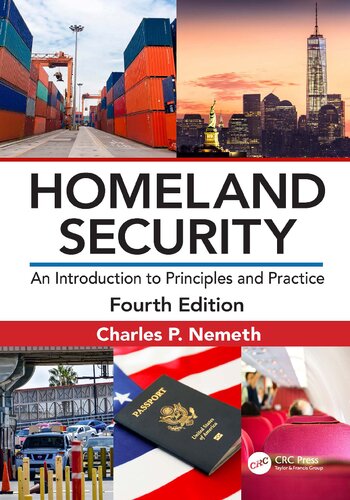

Most ebook files are in PDF format, so you can easily read them using various software such as Foxit Reader or directly on the Google Chrome browser.
Some ebook files are released by publishers in other formats such as .awz, .mobi, .epub, .fb2, etc. You may need to install specific software to read these formats on mobile/PC, such as Calibre.
Please read the tutorial at this link. https://ebooknice.com/page/post?id=faq
We offer FREE conversion to the popular formats you request; however, this may take some time. Therefore, right after payment, please email us, and we will try to provide the service as quickly as possible.
For some exceptional file formats or broken links (if any), please refrain from opening any disputes. Instead, email us first, and we will try to assist within a maximum of 6 hours.
EbookNice Team

Status:
Available4.6
16 reviewsHomeland Security: An Introduction to Principles and Practice, Fourth Edition continues its record of providing a fully updated, no-nonsense textbook to reflect the latest policy, operational, and program changes to the Department of Homeland Security (DHS) over the last several years. The blend of theory with practical application instructs students on how to understand the need to reconcile policy and operational philosophy with the practical application of technologies and implementation of practices.
The homeland security landscape of today is vastly different of that immediately following 9/11 and back when DHS was established in November of 2002. Domestic and international terrorism, gun violence, the geopolitical landscape, critical infrastructure security challenges, pandemic response―particularly with COVID-19―and disaster management have all become more complex and increasingly imperative.
The new edition is completely updated to reflect changes to both new challenges and continually changing considerations. This includes: facial recognition, intelligence gathering techniques, information sharing databases, white supremacy, domestic terrorism and lone wolf actors, border security and immigration, the use of drones and surveillance technology, cybersecurity, the status of ISIS and Al Qaeda, the increased nuclear threat, COVID-19, ICE, DACA, and immigration policy challenges―among numerous others. Consideration of, and the coordinated response, to all these is housed among a myriad of federal agencies and departments.
Homeland Security, Fourth Edition continues to serve as the comprehensive and authoritative text. The book presents the various DHS state and federal agencies and entities within the government―their role, how they operate, their structure, and how the interact with other agencies―to protect U.S. domestic interests from various dynamic threats.